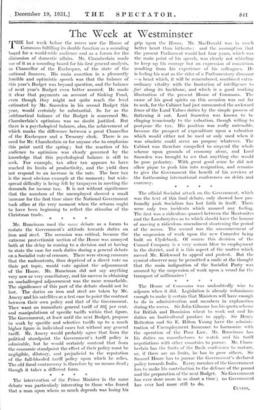The Week at Westminster
THE last week before the recess saw the House of Commons fulfilling its double function as a sounding board for a world-wide audience and as a forum for the discussion of domestic affairs. Mr. Chamberlain made use of it as a sounding board for his first general analysis, as Chancellor of the Exchequer, of the state of the national finances. His main assertion in a pleasantly forcible and optimistic speech was that the balance of this year's Budget was beyond question, and the balance of next year's Budget even better assured. He made it clear that payments on account of Sinking Fund, even though they might not quite reach the level estimated by Mr. Snowden in his second Budget this year, would certainly be substantial. So far as the arithmetical balance of the Budget is concerned Mr. Chamberlain's optimism was no doubt justified. But there is a psychological balance, also, the achievement of which marks the difference between a great Chancellor of the Exchequer and a Treasury clerk. There is no need for Mr. Chamberlain or for anyone else to emphasize this point until the spring ; but the reaction of his audience to optimism was clearly governed by the knowledge that this psychological balance is still to seek. For example, tax after tax appears to have reached its limits of productivity, and the yield does not respond to an increase in the rate. The beer tax is the most obvious example at the moment; but wide- spread difficulty is being felt by taxpayers in meeting the demands for income tax. It is not without significance that the numbers of the unemployed showed a small increase for the first time since the National Government took office at the very moment when the returns ought to have been beginning to reflect the stimulus of the Christmas trade.


































 Previous page
Previous page